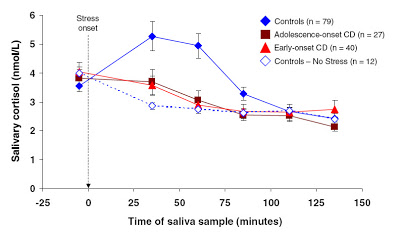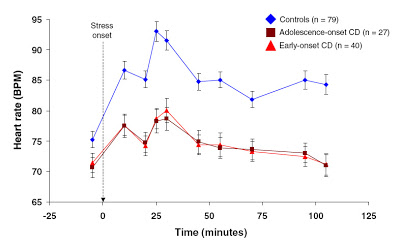Bad boys, bad boys whatcha gonna do

Bad Boys (Cops Theme)NewScientist suggests that an increase in cortisol might be warranted...
by Inner Circle
Bad boys, bad boys
Whatcha gonna do, whatcha gonna do
When they come for you
Bad boys can blame behaviour on their hormones
15:37 30 September 2008
Andy CoghlanOut-of-control boys facing spells in detention or anti-social behaviour orders can now blame it all on their hormones.
The "stress hormone" cortisol – or low levels of it – may be responsible for male aggressive antisocial behaviour, according to new research. The work suggests that the hormone may restrain aggression in stressful situations.
Researchers found that levels of cortisol fell when delinquent boys played a stressful video game, the opposite of what was seen in control volunteers playing the same game.

A new paper by Fairchild et al. (2008) examined the cortisol levels in 70 adolescent boys with conduct disorder (CD) and 95 boys without CD. Within the CD group, 42 received an early-onset (EO-CD) diagnosis and 28 received an adolescence-onset (AO-CD) diagnosis. The authors did this because:
It has been suggested that individuals with EO-CD show neuropsychological impairments. In contrast, AO-CD is considered to arise primarily because of social modeling of deviant peers. We investigated whether this hypothetical distinction between CD subtypes would extend to differences in patterns of cortisol secretion or cardiovascular activity under basal conditions or during stress.The basal samples were collected at 4 different times during the day over the course of 3 days. Psychosocial stress was induced by subjecting the boys to the frustrating experience of playing a game against a hostile opponent, and by providing them with ample negative feedback. Basically, the procedure
What were the results? Briefly, the basal levels of cortisol in the CD group were slightly elevated at the evening time point, when the diurnal rhythm of cortisol is typically at a low point. In contrast, the boys with CD showed a drop in cortisol levels during the stressful game, as opposed to the elevated cortisol levels exhibited by the boys without CD (shown below)....involves inducing frustration and provocation between the participant and a prerecorded video opponent.
The competition began between 1 and 2 pm with a task involving confrontation, the Prisoner's Dilemma Game (PDG), in which the opponent always failed to cooperate and sent antagonistic messages. Frustration was induced by having the participant perform a difficult, computer-based manual precision task (MPT) under time pressure while the video opponent and experimenter watched. By design, all participants failed to achieve their target score and received negative evaluations of their performance from the opponent. Following these tasks, participants completed further challenging cognitive tasks aimed at increasing performance uncertainty. Finally, they watched their opponent play the MPT and could remotely disrupt the opponent's performance. At the end of the session (between 3 and 4 pm), participants were told they had won the competition.

Figure 2 (Fairchild et al., 2008). Mean (+SEM) salivary cortisol levels at seven time points during psychosocial stress. Under stressful conditions, the elevation in cortisol levels between baseline (-5 min) and +35 min in control subjects was markedly reduced in participants from both CD subgroups. The dashed arrow shows onset of the psychosocial stressor, and all times are shown relative to stressor onset. The dashed line and open diamond symbols show data from 12 control subjects that were not exposed to stress for comparison purposes.
Similar results were observed for heart rate:

Figure 4 (Fairchild et al., 2008). Mean (+SEM) heart rate, expressed in beats per minute (BPM), across the 10 tasks that formed the psychosocial stressor. Heart rate levels did not differ significantly at baseline [although a trend at p=.08], but cardiovascular responses to stress were markedly attenuated in both CD subgroups relative to control subjects.
So what does it all mean? As the authors explain:
Our findings of blunted cortisol and cardiovascular responses to stress in AO-CD and EO-CD participants relative to control subjects contradicts the developmental taxonomic theory, which implies that such neurobiological differences should be unique to EO-CD. Physiologic hyporeactivity during stress could reflect a latent trait that increases vulnerability to CD, whereas age of CD onset may be moderated by psychosocial factors (e.g., differences in parental supervision, exposure to antisocial models). Alternatively, it may be unnecessary to invoke a latent trait in either subgroup: rather, both CD subgroups may have experienced increased social adversity during development (e.g., maltreatment), or, because of heightened risk-taking behaviors, they may place themselves in stressful situations more frequently than other adolescents (leading to habituation to stressors).So those bad boys need a cortisol adjustment...or else a more relaxing and supportive environment.
ADDENDUM: For a lengthy and thorough thrashing of this article (and of The Neurocritic's light treatment thereof), see Bad Boys or Bad Science by Daniel Lende of Neuroanthropology. Although my sarcastic COPS reference was an admittedly lazy critique of the press coverage and only an oblique criticism of the diagnosis of conduct disorder, I believe Lende goes overboard in saying the authors are complete biological determinists, because they did acknowledge the alternative [i.e., see the Fairchild et al. quote above, "...rather, both CD subgroups may have experienced increased social adversity during development (e.g., maltreatment)..."].
Reference
G FAIRCHILD, S VANGOOZEN, S STOLLERY, J BROWN, J GARDINER, J HERBERT, I GOODYER (2008). Cortisol Diurnal Rhythm and Stress Reactivity in Male Adolescents with Early-Onset or Adolescence-Onset Conduct Disorder Biological Psychiatry, 64 (7), 599-606 DOI: 10.1016/j.biopsych.2008.05.022
BACKGROUND: Previous studies have reported lower basal cortisol levels and reduced cortisol responses to stress in children and adolescents with conduct disorder (CD). It is not known whether these findings are specific to early-onset CD. This study investigated basal and stress-induced cortisol secretion in male participants with early-onset and adolescence-onset forms of CD. METHODS: Forty-two participants with early-onset CD, 28 with adolescence-onset CD, and 95 control subjects participated in the study. They collected saliva across the day to assess their cortisol awakening response and diurnal rhythm. Subsequently, salivary cortisol was measured before, during, and after a psychosocial stress procedure designed to elicit frustration. Cardiovascular activity and subjective mood states were also assessed during stress exposure. RESULTS: There were no group differences in morning cortisol levels or the size of the cortisol awakening response. Basal cortisol levels in the evening and at 11 am during the laboratory visit were higher in both CD subgroups relative to control subjects. In contrast, cortisol and cardiovascular responses to psychosocial stress were reduced in both CD subgroups compared with control subjects. All groups reported similar increases in negative mood states during stress. CONCLUSIONS: Our findings suggest that group differences in cortisol secretion are most pronounced during stress exposure, when participants with CD show cortisol hyporeactivity compared with control subjects. There was no evidence for reduced basal cortisol secretion in participants with CD, but rather increased secretion at specific time points. The results do not support developmentally sensitive differences in cortisol secretion between CD subtypes.
 Watch the weirdest segment of COPS ever!
Watch the weirdest segment of COPS ever!(courtesy of Ms. Underestimated)
- How Does Stress Affect Your Public Speaking Skills?
Having to give a talk or a speech in front of a large group of people is one of the scarier things we might find ourselves having to do at some point in our lives. In those situations, ideally we want to give a flawless, well-rehearsed delivery, and getting...
- Living In A City, Or Growing Up In One, Is Associated With Heightened Brain Sensitivity To Social Stress
Without fanfare or formal announcement, human civilisation has passed a momentous milestone. For the first time, more of us now live in cities than in rural communities. The benefits are numerous: more jobs, better access to educational and health services,...
- I Just Finished The Boston Marathon! (but I Can't Remember Your Name)
Third place finisher Ryan Hall at the 2009 Boston Marathon. Photo courtesy of Martin Checkoway. Running a 26.2 mile marathon is an exhausting endeavor for anyone, from the top Ethiopian and Kenyan runners to the astounding 75 year old Jim Schleisman...
- Wrigley-funded Study Finds Chewing Gum May Help Reduce Stress
In other news, a study funded by Smith & Wesson finds shooting guns may help reduce stress. New research finds chewing gum may help reduce stress WHAT: "An investigation into the effects of gum chewing on mood and cortisol levels during psychological...
- Great Opportunity For A Recent Or Soon To Be Grad With Child And Research Experience!
Project Coordinator University of Maryland Child Stress and Emotions Lab Description: -The Child Stress and Emotions Lab is currently running the following studies: - The developmental origins of our body’s stress response system and how the stress...
